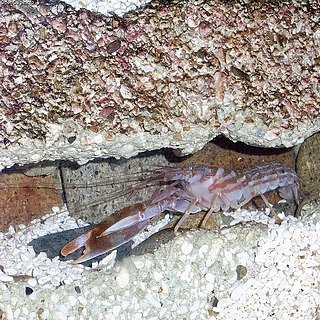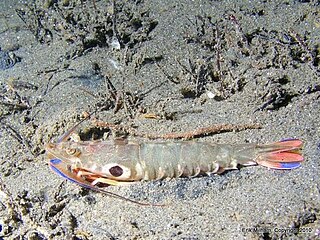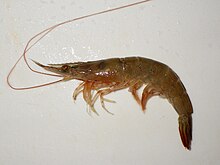
The Decapoda or decapods are an order of crustaceans within the class Malacostraca, including many familiar groups, such as crabs, lobsters, crayfish, shrimp and prawns. Most decapods are scavengers. The order is estimated to contain nearly 15,000 species in around 2,700 genera, with around 3,300 fossil species. Nearly half of these species are crabs, with the shrimp and Anomura including hermit crabs, porcelain crabs, squat lobsters making up the bulk of the remainder. The earliest fossil decapod is the Devonian Palaeopalaemon.

Henri Milne-Edwards was an eminent French zoologist.

Xanthidae is a family of crabs known as gorilla crabs, mud crabs, pebble crabs or rubble crabs. Xanthid crabs are often brightly coloured and are highly poisonous, containing toxins which are not destroyed by cooking and for which no antidote is known. The toxins are similar to the tetrodotoxin and saxitoxin produced by puffer fish, and may be produced by bacteria in the genus Vibrio living in symbiosis with the crabs, mostly V. alginolyticus and V. parahaemolyticus.

Alpheus is a genus of snapping shrimp of the family Alpheidae. This genus contains in excess of 291 species, making this the most species-rich genus of shrimp. Like other snapping shrimp, the claws of Alpheus are asymmetrical, with one of the claws enlarged for making a popping noise. Some species in the genus enter into symbiotic relationships with gobiid fishes, and others associate with sea anemones. It's also the noisiest of all sea creatures and can immobilize small fish with its high pitched frequency.

Majidae is a family of crabs, comprising around 200 marine species inside 52 genera, with a carapace that is longer than it is broad, and which forms a point at the front. The legs can be very long in some species, leading to the name "spider crab". The exoskeleton is covered with bristles to which the crab attaches algae and other items to act as camouflage.

Macrophthalmus is a genus of crabs which are widespread across the Indo-Pacific. It contains the following species :

Charybdis is a genus of swimming crabs in the family Portunidae; "Charybdis" is Greek for whirlpool.

Palaemon is a genus of caridean shrimp of the family Palaemonidae. The conventional circumscription of the genus Palaemon is probably paraphyletic. Molecular data suggest that Palaemonetes, as well as the genera Exopalaemon and Couteriella, are nested within Palaemon. Phylogenetic affinities in these groups correspond better with geographical origin than conventional genus assignments.

Calappidae is a family of crabs containing 16 genera, of which 7 are only known as fossils:

Pilumnoidea is a superfamily of crabs, whose members were previously included in the Xanthoidea. The three families are unified by the free articulation of all the segments of the male crab's abdomen and by the form of the gonopods. The earliest fossils assigned to this group are of Eocene age.

Inachidae is a family of crabs, containing 39 genera:

Epialtinae is a subfamily of crabs, containing the following genera:

Hemigrapsus is a genus of varunid crabs comprising thirteen species native almost exclusively in the Pacific Ocean, but two have been introduced to the North Atlantic region.

Metapenaeopsis, the velvet shrimps, is a prawn genus in the family Penaeidae. It contains these species:

Mursia is a genus of crabs in the family Calappidae, containing the following species:

Sicyonia is a genus of prawns, placed in its own family, Sicyoniidae. It differs from other prawns in that the last three pairs of its pleopods are uniramous, rather than biramous as seen in all other prawns.

Pilumnus is a genus of crabs, containing the following species:

Solenocera is a genus of prawns in the family Solenoceridae. Solenocera occur from 0 to 2,067 meters deep in the ocean.

















